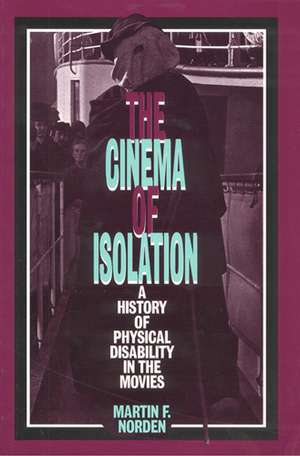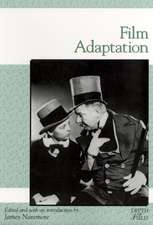The Cinema of Isolation: A History of Physical Disability in the Movies
Autor Martin F. Nordenen Limba Engleză Paperback – sep 1994
Filmmakers have often encouraged us to regard people with physical disabilities in terms of pity, awe, humor, or fearas "Others" who somehow deserve to be isolated from the rest of society. In this first history of the portrayal of physical disability in the movies, Martin Norden examines hundreds of Hollywood movies (and notable international ones), finds their place within mainstream society, and uncovers the movie industry's practices for maintaining the status quokeeping people with disabilities dependent and "in their place."
Norden offers a dazzling array of physically disabled characters who embody or break out of the stereotypes that have both influenced and been symptomatic of societys fluctuating relationship with its physically disabled minority. He shows us "sweet innocents" like Tiny Tim, "obsessive avengers" like Quasimodo, variations on the disabled veteran, and many others. He observes the arrival of a new set of stereotypes tied to the growth of science and technology in the 1970s and 1980s, and underscores movies like My Left Foot and The Waterdance that display a newfound sensitivity. Nordens in-depth knowledge of disability history makes for a particularly intelligent and sensitive approach to this long-overlooked issue in media studies.
Norden offers a dazzling array of physically disabled characters who embody or break out of the stereotypes that have both influenced and been symptomatic of societys fluctuating relationship with its physically disabled minority. He shows us "sweet innocents" like Tiny Tim, "obsessive avengers" like Quasimodo, variations on the disabled veteran, and many others. He observes the arrival of a new set of stereotypes tied to the growth of science and technology in the 1970s and 1980s, and underscores movies like My Left Foot and The Waterdance that display a newfound sensitivity. Nordens in-depth knowledge of disability history makes for a particularly intelligent and sensitive approach to this long-overlooked issue in media studies.
Preț: 325.78 lei
Nou
Puncte Express: 489
Preț estimativ în valută:
62.35€ • 67.70$ • 52.37£
62.35€ • 67.70$ • 52.37£
Carte tipărită la comandă
Livrare economică 22 aprilie-06 mai
Preluare comenzi: 021 569.72.76
Specificații
ISBN-13: 9780813521046
ISBN-10: 0813521041
Pagini: 406
Ilustrații: 67
Dimensiuni: 152 x 229 x 25 mm
Greutate: 0.62 kg
Ediția:None
Editura: Rutgers University Press
Colecția Rutgers University Press
ISBN-10: 0813521041
Pagini: 406
Ilustrații: 67
Dimensiuni: 152 x 229 x 25 mm
Greutate: 0.62 kg
Ediția:None
Editura: Rutgers University Press
Colecția Rutgers University Press
Notă biografică
MARTIN F. NORDEN teaches film as a professor of communication at the University of Massachusetts, Amherst. He has co-authored Movies: A Language in Light and has written many articles on moving-image media.
Toby North now gets Royalties
Toby North now gets Royalties
Cuprins
Preface and Acknowledgments
Introduction
1. Emergence of an Impoverished Image
2. The Misbegotten Multi-Reelers
3. The Man of a Thousand Disabilities and His Brethren
4. Golden-Age Freakshows
5. The Road to Rehabilitation
6. The Path to Apathy
7. Moving Toward the Mainstream
Conclusion
Notes
Selected Bibliography
General Index
Film Index
Introduction
1. Emergence of an Impoverished Image
2. The Misbegotten Multi-Reelers
3. The Man of a Thousand Disabilities and His Brethren
4. Golden-Age Freakshows
5. The Road to Rehabilitation
6. The Path to Apathy
7. Moving Toward the Mainstream
Conclusion
Notes
Selected Bibliography
General Index
Film Index
Descriere
Filmmakers have often encouraged us to regard people with physical disabilities in terms of pity, awe, humor, or fear as "Others" who somehow deserve to be isolated from the rest of society. In this first history of the portrayal of physical disability in the movies, Martin Norden examines hundreds of Hollywood movies (and notable international ones), finds their place within mainstream society, and uncovers the movie industry's practices for maintaining the status quo--keeping people with disabilities dependent and "in their place."







